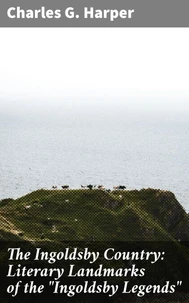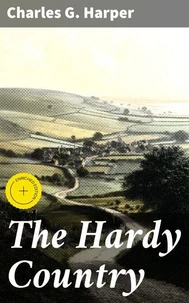Summer Days in Shakespeare Land. Exploring Shakespeare's Literary Landscapes through Time
Par :Formats :
Disponible dans votre compte client Decitre ou Furet du Nord dès validation de votre commande. Le format ePub est :
- Compatible avec une lecture sur My Vivlio (smartphone, tablette, ordinateur)
- Compatible avec une lecture sur liseuses Vivlio
- Pour les liseuses autres que Vivlio, vous devez utiliser le logiciel Adobe Digital Edition. Non compatible avec la lecture sur les liseuses Kindle, Remarkable et Sony
 , qui est-ce ?
, qui est-ce ?Notre partenaire de plateforme de lecture numérique où vous retrouverez l'ensemble de vos ebooks gratuitement
Pour en savoir plus sur nos ebooks, consultez notre aide en ligne ici
- Nombre de pages230
- FormatePub
- ISBN4057664576194
- EAN4057664576194
- Date de parution19/05/2021
- Protection num.Digital Watermarking
- Taille3 Mo
- Infos supplémentairesepub
- ÉditeurGOOD PRESS
Résumé
In "Summer Days in Shakespeare Land, " Charles G. Harper masterfully weaves a narrative that traverses the landscapes and locales associated with William Shakespeare'Äôs life and works. Through vivid descriptions and rich anecdotes, Harper invites readers into the enchanting world of Elizabethan England, exploring the geography and historical significance of places such as Stratford-upon-Avon and the Globe Theatre.
His lyrical prose captures the essence of Shakespeare'Äôs genius, revealing how these environments influenced the playwright's creations while providing a contextual backdrop for his enduring legacy in literature. Charles G. Harper, a noted writer and bibliophile of the late 19th and early 20th centuries, was deeply fascinated by the cultural and historical legacy of Shakespeare. His extensive travels and keen observations shaped his understanding of the Bard's influence on English literature and theater.
Harper's background in art and literature equipped him with the unique ability to blend travelogue and literary criticism, making this work not only a guide for Shakespeare enthusiasts but also a personal pilgrimage through the heart of English literary heritage. To those who cherish Shakespeare'Äôs works or wish to immerse themselves in the charm of the lands that inspired him, Harper's "Summer Days in Shakespeare Land" serves as an invaluable companion.
This book not only enriches one'Äôs understanding of Shakespeare'Äôs context but also awakens a profound appreciation for the beauty and complexity of his art.
His lyrical prose captures the essence of Shakespeare'Äôs genius, revealing how these environments influenced the playwright's creations while providing a contextual backdrop for his enduring legacy in literature. Charles G. Harper, a noted writer and bibliophile of the late 19th and early 20th centuries, was deeply fascinated by the cultural and historical legacy of Shakespeare. His extensive travels and keen observations shaped his understanding of the Bard's influence on English literature and theater.
Harper's background in art and literature equipped him with the unique ability to blend travelogue and literary criticism, making this work not only a guide for Shakespeare enthusiasts but also a personal pilgrimage through the heart of English literary heritage. To those who cherish Shakespeare'Äôs works or wish to immerse themselves in the charm of the lands that inspired him, Harper's "Summer Days in Shakespeare Land" serves as an invaluable companion.
This book not only enriches one'Äôs understanding of Shakespeare'Äôs context but also awakens a profound appreciation for the beauty and complexity of his art.
In "Summer Days in Shakespeare Land, " Charles G. Harper masterfully weaves a narrative that traverses the landscapes and locales associated with William Shakespeare'Äôs life and works. Through vivid descriptions and rich anecdotes, Harper invites readers into the enchanting world of Elizabethan England, exploring the geography and historical significance of places such as Stratford-upon-Avon and the Globe Theatre.
His lyrical prose captures the essence of Shakespeare'Äôs genius, revealing how these environments influenced the playwright's creations while providing a contextual backdrop for his enduring legacy in literature. Charles G. Harper, a noted writer and bibliophile of the late 19th and early 20th centuries, was deeply fascinated by the cultural and historical legacy of Shakespeare. His extensive travels and keen observations shaped his understanding of the Bard's influence on English literature and theater.
Harper's background in art and literature equipped him with the unique ability to blend travelogue and literary criticism, making this work not only a guide for Shakespeare enthusiasts but also a personal pilgrimage through the heart of English literary heritage. To those who cherish Shakespeare'Äôs works or wish to immerse themselves in the charm of the lands that inspired him, Harper's "Summer Days in Shakespeare Land" serves as an invaluable companion.
This book not only enriches one'Äôs understanding of Shakespeare'Äôs context but also awakens a profound appreciation for the beauty and complexity of his art.
His lyrical prose captures the essence of Shakespeare'Äôs genius, revealing how these environments influenced the playwright's creations while providing a contextual backdrop for his enduring legacy in literature. Charles G. Harper, a noted writer and bibliophile of the late 19th and early 20th centuries, was deeply fascinated by the cultural and historical legacy of Shakespeare. His extensive travels and keen observations shaped his understanding of the Bard's influence on English literature and theater.
Harper's background in art and literature equipped him with the unique ability to blend travelogue and literary criticism, making this work not only a guide for Shakespeare enthusiasts but also a personal pilgrimage through the heart of English literary heritage. To those who cherish Shakespeare'Äôs works or wish to immerse themselves in the charm of the lands that inspired him, Harper's "Summer Days in Shakespeare Land" serves as an invaluable companion.
This book not only enriches one'Äôs understanding of Shakespeare'Äôs context but also awakens a profound appreciation for the beauty and complexity of his art.









